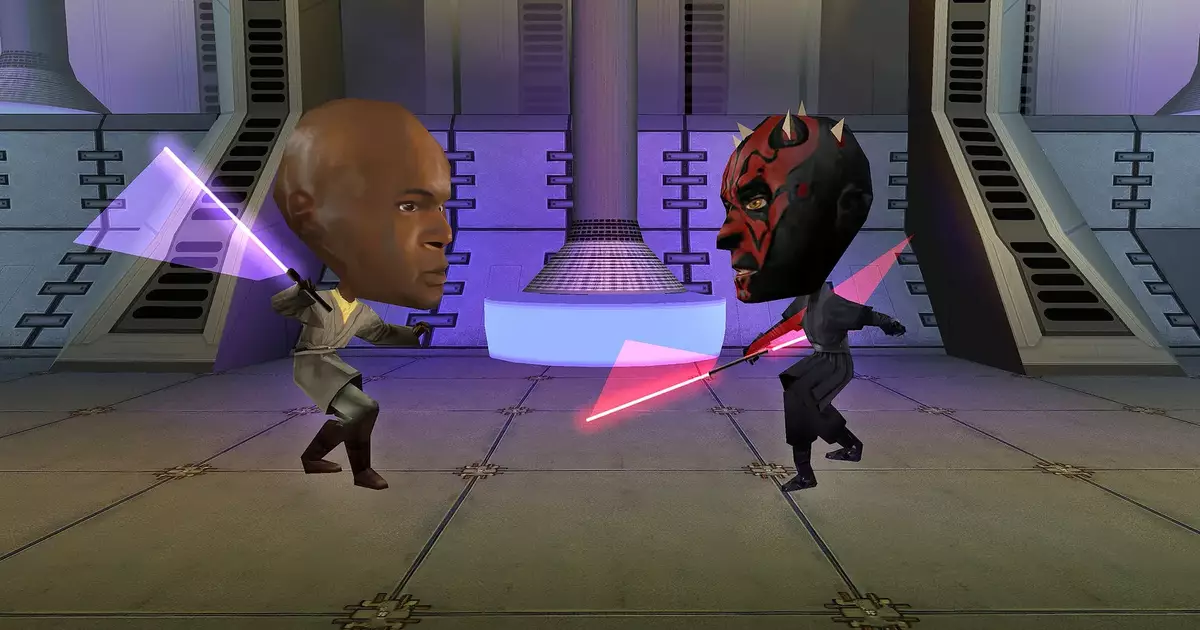In the realm of video games, nostalgia holds a unique power over players. It is often said that those who grew up with iconic titles carry an unbreakable bond with them, a sentiment echoed in the recent announcement from Aspyr Games about the porting of *Star Wars: Episode I: Jedi Power Battles* to PC and Steam. This revival isn’t just a technical update; it’s a chance to revisit a time of cherished memories and latent scars accumulated during gaming marathons. The game, initially launched in 2000, was more than just a platformer-brawler—it was a defining facet of a generation’s engagement with the Star Wars universe.
For many, the experience of playing *Jedi Power Battles* was akin to a rite of passage. One gamer’s recollection reveals a profound relationship with the game—not only as a source of entertainment but as a backdrop to formative years. The mention of physical scars, such as sore thumbs from mashing buttons on a dubious PS1 controller, hints at the emotional and physical investment players made in their gaming experiences. The endless nights spent battling through digital landscapes blurred the lines between reality and imagination, transforming the mundane act of gaming into an epic saga filled with colorful lightsabers and intense dueling mechanics.
In delving into this complicated relationship, one recognizes how the game’s themes resonate with personal narratives. The joyous yet painfully awkward adolescent years spent shaped by fandom lead to a complex interaction with the game. For instance, the ability to detach oneself from inherent reality, imagining the Jedi’s prowess while longing for adventure, resonates profoundly beyond mere pixels on a screen.
Jedi Power Battles presents an intriguing gameplay experience, drawing players into a world rife with nostalgia while simultaneously exposing its quirks and limitations. The game intertwines the storyline of *The Phantom Menace* with dynamic platforming action and engaging lightsaber brawls. Yet, in retrospect, the execution of specific characters like Qui-Gon Jinn and Obi-Wan Kenobi can raise some eyebrows. The clunky mechanics that often see them tumble into pitfalls or struggle against simple foes remind players that, while nostalgic, not every element aged gracefully.
Nostalgic memories can be dulled by the realization that some moments may not have lived up to the grandeur imagined as a child. Despite these flaws, there is an undeniable charm in the animated Jedi move sets, which invite debate and discussion among fans. These moments are more profound than mere gameplay; they are a reflection of community connections formed through shared interests and discussions that last into the early hours of the morning, often ending in self-reflection and humor over one’s journey as a gamer.
As Aspyr ventures to modernize *Jedi Power Battles*, players are met with both excitement and skepticism. The promise of modern controls, scintillating visuals, and various playable characters such as the Rifle Droid and Tusken Raider adds layers to the original experience. This enhances the potential for both long-time fans and newcomers alike to engage with the title in a contemporary context. Inclusivity in gaming has never been more paramount, and having accessibility options like modern controls ensures the game can be enjoyed by the next generation.
Yet, there remains a cautionary tale about such ports. The gaming community is particularly sensitive to the integrity of beloved titles. Aspyr is tasked with a dual responsibility: to honor the original game’s legacy while ensuring a robust and enjoyable experience for today’s players. This balance is delicate—failures seen in recent ports like *Battlefront* serve as warnings against rushed development and lackluster execution.
As players prepare for the release of *Star Wars: Episode I: Jedi Power Battles* on January 23, there exists a collective breath held in anticipation mixed with skepticism. The legacy of such cherished games is often fraught with complexity as players revisit their past, grappling with both fondness and critique. Ultimately, the re-emergence of Jedi Power Battles serves as a vessel for reflection on the profound impact of gaming culture—a culture that continuously evolves while remaining deeply rooted in nostalgia. Will this revival honor the past and illuminate the future? Only time will tell, but for now, fans can revel in the thrill of revisiting their beloved childhood escapades through the lens of newfound technology.


Leave a Reply